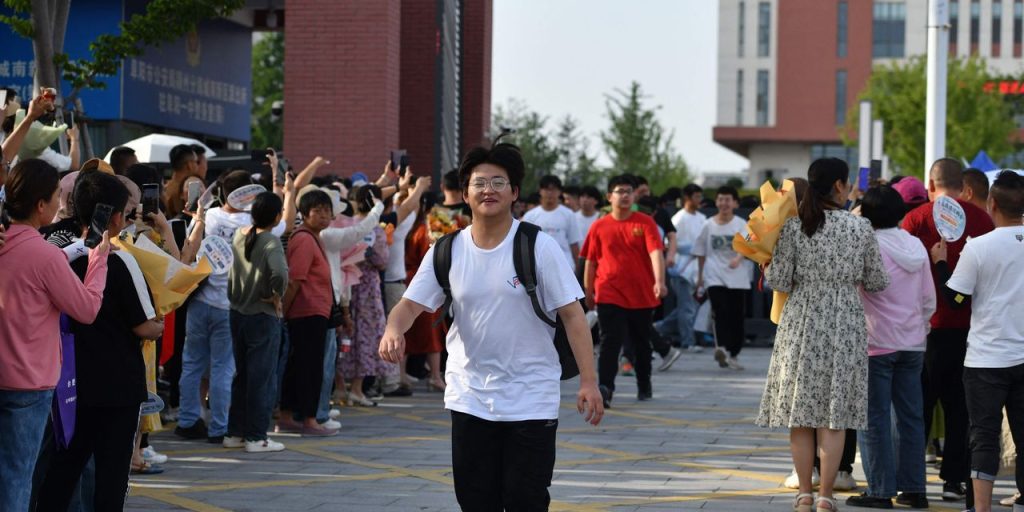Wu Ning is six months back from a master’s degree in the U.K. Originally excited about his return to China as a desirable entrant to the job market, he has fallen into depression.
“I didn’t expect to still be unemployed, living with my parents, and struggling to meet a potential partner,” he told MarketWatch by phone from Beijing. His story mirrors those of dozens of young Chinese interviewed in recent months.
Seismic shifts are reshaping China’s economy and society, and nowhere is it being felt more acutely than among the country’s youth.
China’s youth unemployment is skyrocketing — hitting a record 21.3% in June and expected to continue rising. The rate for the same age group in the U.S. was 7.5% in June, according to the U.S. Bureau of Labor Statistics.
A professor at Peking University, Zhang Dandan, recently wrote in a now-deleted article that the rate may be as high as 46.5%, when those who have given up are included.
Breaking news: China halts release of youth unemployment data
Market Snapshot: U.S. stock futures slide as China growth angst rattles global risk appetite
The record rate of unemployment, underemployment and burnout among the younger demographic is transforming a generation that is coming of age after 30 years of explosive economic growth. Their older peers have known nothing but the golden period of increasing prosperity and opportunity, and many say their parents don’t understand how radically things have changed.
“My mom thinks it’s my fault that I’ve only gotten a restaurant job offer after finishing my degree in Australia,” said Lu Weilin, a 25-year-old now back in her hometown of Chengdu, a metropolis in China’s west.
Having one in five of these consumers out of work — and many more underemployed — has made a huge dent in retail sales, according to official data. June’s was the weakest monthly retail performance since 2022, with particular declines in clothing, cosmetics and automobile sales.
Other sectors are suffering, too. Exports and imports continued to fall last month on a year-on-year basis, even beyond economists’ expectations. Exports — long the fuel of China’s economic engine — plummeted 14.5%, the steepest decline in 44 months. Imports dove for the fifth straight month, by 12.4%, according to official data. The reasons are simple: a lack of demand for goods, abroad and at home.
All this is happening at a time when economists predicted China’s economy would be zipping along after an emergence from COVID-19 hibernation. That rebound has not materialized.
But the effects extend beyond the economic into the social, familial and even longer-term life plans — particularly among the country’s youth. Young people with less access in China find it harder to locate a willing partner. Marriage and birth rates are plummeting. Familial strife is rattling households in which highly qualified, but unemployed, university graduates are forced to live at home.
Many graduates from prestigious Chinese and overseas universities are faced to settle for jobs far beneath their expected status and pay grade.
A recent Chinese graduate from the University of Melbourne — now ranked higher than Yale — finally got an interview with an education company, offering a position she considered “beneath her.” And Instead of making an offer, the company asked whether she would be willing to intern for 150 yuan ($20) per day.
“I can’t think of anything more dispiriting in my life right now,” said the applicant, who asked that only her surname, Wang, be used.
The other side of the coin is equally undesirable.
The soaring jobless rate has given companies that largely employ younger workers — most notoriously tech firms — unprecedented leverage over their employees. To accept a position may mean also accepting a “996” work schedule — 9 a.m. to 9 p.m., six days a week.
This leaves young employees exhausted, burned out from any interest in their work, and short on time and energy to pursue much of a social or love life. Furthermore, studies have shown that early in one’s career, settling even temporarily for positions deemed below one’s credentials has a career-long adverse impact.
But arguably the most profound of these changes will be in China’s demographics. The country is already facing a coming crisis in which an aging population will vastly exceed the number of workers needed to support them.
But young Chinese who can’t afford China’s astronomical housing prices, or who have little time or energy for dating, are likely to push this increasingly unmarried and childless society more quickly toward a tipping point.
Even in China’s ultramodern first-tier cities, young men seeking brides are expected to own a home and preferably a car. Scholars call it the “mother-in-law economy” — referencing a demand by the future bride’s mother that the husband-to-be own property.
A team of Chinese researchers recently published a report that found that “the increasing price of houses, an important measure of marriage cost, has significantly reduced the marriage rate in China.”
“As property prices continue to rise, many young people opt out of marriage because they cannot afford to buy a house,” said study author Zhou Hongyong.
Tanner Brown covers China for MarketWatch and Barron’s.
More dispatches from Tanner Brown:
China’s property woes offer a window into the demise of the country’s boom times
China is not only asserting itself geopolitically but openly questioning the U.S.’s central role on the world stage
American views of China have plummeted in recent years. Here’s what the Chinese think of the U.S.
Foreign businesses in China fear they’re being targeted in a ‘campaign’ of government crackdowns. It’s probably not that simple.
The AI chatbot phenomenon is now making waves in China, too
Read the full article here














